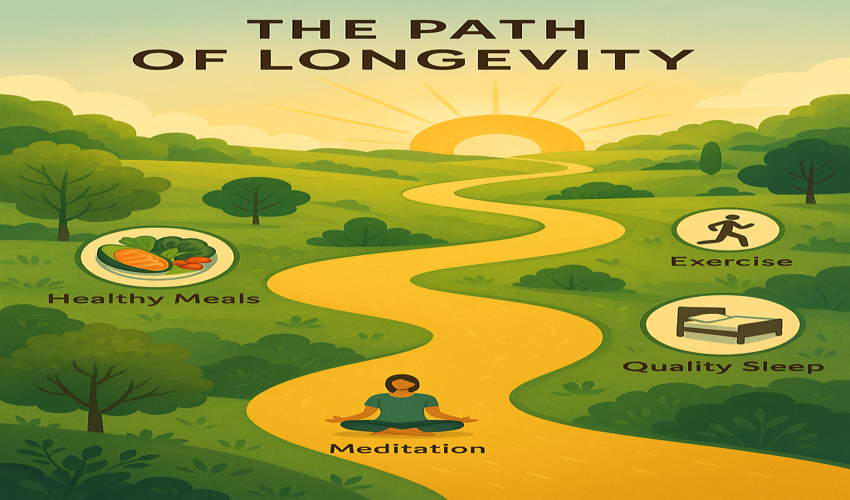In this blog, we’ll explore the science of Lifespan Extension, practical strategies for how to live longer, the role of a longevity diet, and the most powerful lifestyle changes to live longer that go beyond trends to deliver measurable results. Whether you’re aiming to prevent disease, stay active into your 80s and 90s, or simply improve your day-to-day vitality, these principles are rooted in research and real-world success stories.
What Is Lifespan Extension?
Lifespan extension is the idea of living longer and healthier lives by improving medical care, healthy habits, and new technologies. It focuses on preventing diseases and slowing down aging, so we can enjoy more years with good health. This can include eating well, staying active, and using advanced treatments to help the body stay strong. While promising, it also brings up questions about how society will handle longer lives.
Difference Between Lifespan and Healthspan
When people talk about Lifespan Extension, they often picture adding more years to their life. But there’s an important distinction between lifespan and healthspan.
- Lifespan: The total number of years you live.
- Healthspan: The number of years you live free from chronic disease, disability, and cognitive decline.
For example, someone may live until 85 but spend the last 15 years battling diabetes, heart disease, and limited mobility. Another person might also live until 85 but enjoy vibrant health, independence, and mental clarity until their last days. That second scenario is the true goal of habits for long life.
Why Extending Healthspan Matters More Than Just Living Longer
A longer life without good health is often filled with medications, hospital visits, and loss of independence. Extending healthspan means compressing the years of illness, ensuring the majority of your life is lived in good health. This is where lifestyle changes to live longer become critical — they not only push the lifespan boundary but also keep your body and mind functioning at their best.
Science Behind Lifespan Extension
The science behind lifespan extension focuses on understanding and slowing down the aging process. Researchers study how cells age and look for ways to repair damage that happens over time. Some key areas include improving the health of our DNA, using stem cells to regenerate tissues, and reducing inflammation, which is linked to many age-related diseases. Scientists also explore how things like a balanced diet, exercise, and certain medications can help extend life and keep the body functioning well for longer.
How Lifestyle Affects Aging at the Cellular Level
Aging is driven by damage at the cellular level — oxidative stress, chronic inflammation, mitochondrial dysfunction, and DNA damage. Over time, these changes accumulate and lead to organ decline.
Research shows that a longevity diet rich in antioxidants, combined with regular exercise, can reduce free radical damage. Practices like intermittent fasting enhance autophagy — your body’s natural “cellular cleanup” process — helping remove damaged components and regenerate healthier cells.
Role of Epigenetics, Hormones, and Insulin Sensitivity
Epigenetics explains how environmental factors and lifestyle choices turn certain genes on or off. You may have “bad” genes for heart disease, but the right anti-aging lifestyle can silence them.
Insulin sensitivity is another major factor. Chronic high insulin levels accelerate aging, promote fat storage, and increase the risk of diabetes and heart disease. Lowering insulin through a low-glycemic longevity diet and fasting is one of the most effective habits for long life.
Lifestyle Changes to Live Longer
Adopting proven lifestyle changes to live longer can add not just years to your life, but life to your years. Here are some science-backed strategies:
1. Nutrition and the Longevity Diet
- Plant-based focus: Diets rich in vegetables, fruits, legumes, nuts, and whole grains are consistently linked with longer lives.
- Moderate protein: Too much protein, especially from animal sources, activates mTOR (a pathway linked to aging). Balance plant and animal proteins.
- Healthy fats: Omega-3 fatty acids reduce inflammation and support heart and brain health.
- Fasting and caloric restriction: Intermittent fasting, time-restricted eating, or mild caloric restriction improves insulin sensitivity and promotes autophagy.
2. Exercise and Physical Activity
- Aerobic exercise: Activities like walking, cycling, and swimming improve cardiovascular health and oxygen delivery.
- Strength training: Preserves muscle mass and bone density, both of which decline with age.
- Mobility and flexibility: Yoga, Pilates, or stretching maintain joint function and reduce injury risk.
Consistency is more important than intensity. Even brisk walking for 30 minutes a day is one of the best lifestyle changes to live longer.
3. Stress Management and Mental Health
Chronic stress accelerates cellular aging through elevated cortisol and inflammation. Long-term stress also weakens immunity and damages the cardiovascular system. Effective stress management practices include:
- Meditation and mindfulness
- Deep breathing and yoga
- Quality social connections
- Time in nature
A sense of purpose — what the Japanese call “Ikigai” — is strongly associated with longevity.
4. Sleep and Recovery
Sleep is when your body repairs DNA, restores hormones, and clears toxins from the brain. Poor sleep increases risk of obesity, diabetes, heart disease, and cognitive decline.
- Aim for 7–9 hours of restorative sleep per night.
- Maintain a consistent sleep-wake cycle.
- Avoid blue light and heavy meals before bed.
5. Avoiding Harmful Habits
Certain habits drastically shorten lifespan:
- Smoking is the #1 preventable cause of early death.
- Excessive alcohol damages the liver, heart, and brain.
- Ultra-processed foods accelerate aging via inflammation and insulin resistance.
- Sedentary lifestyle is considered the “new smoking.”
Practical Tips for Adopting Habits for a Long Life
Making these lifestyle changes to live longer doesn’t require radical overnight transformation. Instead, focus on small, consistent habits:
- Replace one processed meal per day with a whole-food, plant-based meal.
- Schedule short walking breaks throughout your day.
- Practice gratitude journaling for 5 minutes before bed.
- Set a “digital sunset” by turning off screens 1 hour before sleep.
- Join a community or group activity to stay socially connected.
These small steps compound over years into massive differences in both lifespan and healthspan.
Conclusion
Extending lifespan isn’t about chasing immortality — it’s about maximizing the years of vibrant, independent, and meaningful life you get to live. By combining science-backed strategies like the longevity diet, regular physical activity, stress management, restorative sleep, and avoiding harmful habits, you can greatly improve both lifespan and healthspan. The key to how to live longer lies not in quick fixes, but in sustainable, daily choices. Start small, stay consistent, and let your habits shape a future filled with vitality and purpose.






